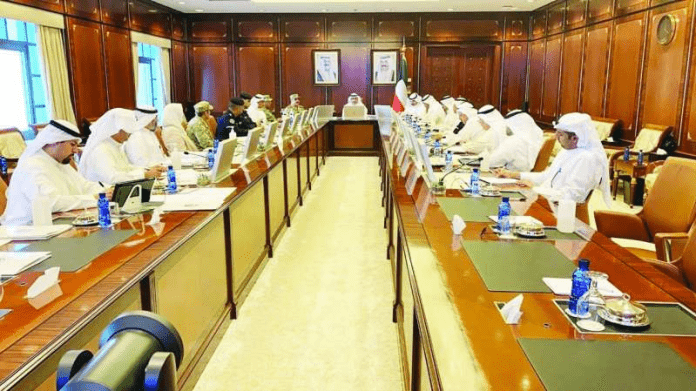Deputy Prime Minister, Minister of Oil, Minister of State for Cabinet Affairs and Acting Minister of State for National Assembly Affairs, Dr. Muhammad Al-Fares, while stressing on the importance of the role of the Supreme National Committee to enhance the food and water security system, to achieve the desired goals in accordance with the directives of the political leadership, pointed out that the committee focused on the formation to form two teams, the first which is currently working to address the imbalances and build a base for the food and water security system and the second has begun to prepare a strategy that takes into account many aspects, as it specializes in how to address issues such as supplies, ports and others.
In a statement to a local Arabic daily after the second meeting of the Food Security Committee, chaired by Al-Fares at Seif Palace, Al-Fares, the focus was on the committee as the main focal point for following up and achieving goals with regard to food and water security in Kuwait.
During the meeting stressed on the importance of the committee coordinating and regulating relations between government and private agencies in Kuwait, which number 35, and are specialized in the areas of food and water security and explained that the committee is working on preparing the strategy for the food and water security system, and how to implement it, as it began to set the basic lines for its work.
He stated that “it was agreed in the meeting on two main points: the first is that a specialized Kuwaiti team will be formed to develop the main points of the strategy,” noting that this team “comprising young people specialized in the fields of food and water security, and how to develop the strategy, its components, initiatives and how to implement it.”
He added, “As for the second point, it is a discussion of the structural problems and imbalances in the current food and water security system,” noting Kuwait’s experience during the “Corona” crisis and also during the conditions of the war between Russia and Ukraine, which “caused problems in the delivery of food and its impact on the operation of the food system in Kuwait.”
He said that among the structural problems and imbalances in the food and water security system in Kuwait, “there is an overlap between the tasks and competencies of some government agencies and between government agencies and the private sector.”
He stated that “the committee will discuss the problems and imbalances during the next four weeks, with the concerned authorities, to develop solutions to address these issues, whether they are related to legislative problems that we may need to issue regulations regarding, or financial and administrative matters in which we may need to take recommendations.”
He indicated that during the coming period, working groups will be formed from the committee, specialized in many topics included in the strategy of the food and water security system, whether in the areas of providing food and investment abroad, investing at home or supporting the private sector.
The researcher at the Kuwait Institute for Scientific Research, Dr. Hussam Al-Amira, said that the meeting discussed many items and broad lines and a draft strategy for food and water work in the State of Kuwait was prepared, and several basic pillars of this strategy were agreed upon.
In a statement to KUNA after the meeting, Al-Amira identified the pillars as:
1 – Improving the efficiency and marketing of local production in the State of Kuwait, from which many initiatives emerge to be converted into activities and then projects in which the authorities are identified with the time period, measurement indicators and targets for each indicator.
2 – Enhancing the strategic stock of food and fodder due to its importance on both sides.
3 – Investing in food security locally or investing abroad.
4 – Raising the efficiency of the flow of food commodities and fodder to Kuwait, where 95 percent of the food stuff is imported.
5 – Improving support and substrate systems.
6 – Rationalizing food consumption, as many foods cause diseases, while the concept of food security means that food does not cause diseases and is of sound quality in order to benefit from it.
7 – In the event of emergencies, wars and disasters, there is a proactive pillar concerned with crisis management and the nature of the role of the private sector in this regard.
The meeting also discussed data analysis and design of decision-making systems, as it is not possible to build a strategy without a database through strategic inventory, demographics, storage places, etc, which will be converted later into initiatives.

















